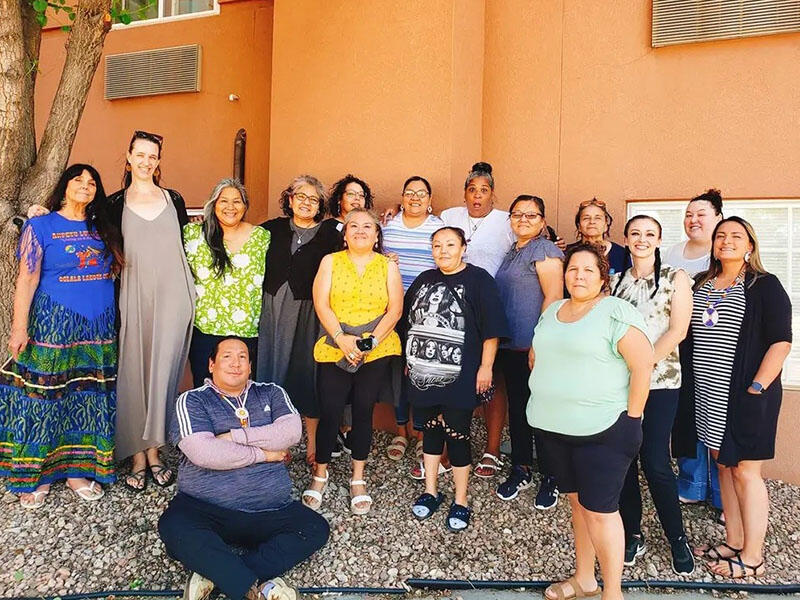Staff members at Sanford Behavioral Health in Bemidji, Minnesota, are on the front lines of some of the most difficult problems in health care today, and one of those problems is substance abuse. The issue is compounded in Bemidji, where addiction recovery can be even more difficult for Native Americans who live just beyond the borders in one of the surrounding reservations.
What is Wellbriety?
Mindie Bird is a licensed alcohol and drug counselor at Sanford of Northern Minnesota, working on behalf of the hospital’s substance abuse disorder services. She is also a Native American, originally from the Black Feet Nation in northern Montana, but having spent most of her life in Bemidji. She is leading Sanford Health’s efforts to become certified in a program called Wellbriety.
“Wellbriety is a program that is for Natives in recovery, by Natives in recovery. It’s a community approach to recovery, much like AA, but it’s Native American-specific. It’s a big deal for Sanford because we are one of the very first agencies to pursue certification that is a non-Indigenous agency,” said Bird. “It’s creating a standard of care within behavioral health programs on what Native American recovery could look like.”
Related: Sanford Bemidji receives national Wellbriety certification
Alongside Bird is Joseph Beaudreau, a long-time Indian health advocate at Sanford Bemidji, who recently transitioned into behavioral health. Beaudreau is part of the White Earth Band of Ojibwe, and he too sees Sanford’s commitment to Wellbriety as a positive step for the surrounding communities.
“It’s a little bit different than AA in that it’s more culturally specific in the spirituality,” said Beaudreau, now a peer support specialist with Sanford. “The very term ‘Wellbriety’ is speaking about holistic well-being: mind, body and soul. If you’re not taking care of the spirit, then all the things that are going on deep inside are going to affect what’s out here, in our body, in our emotions and in our mind.”
Personal relationships with recovery
Both Bird and Beaudreau have personal relationships with substance abuse. Bird has lost family members to drugs and alcohol, while Beaudreau is himself a recovering alcoholic, having been sober now for 25 years. Those deeply personal experiences inform the way that they treat their patients, and help explain why adding Wellbriety at Sanford was so important.
“This is a huge passion project for me,” said Bird. “I’ve worked in addiction and recovery for 10 years now. I was originally going to be a nurse, when one of the elders picked me up and was like, ‘You’re gonna do this. You’re gonna be a counselor.’
“I’m from a family who’s had addictions. It was normal for me. I didn’t know there was anything different. And so when I started my own healing journey and realized what that could look like for me, I became really passionate on how can I create that for other people.”
Sanford’s path to programming
So Bird reached out to her supervisors about adding Wellbriety.
“There was phenomenal support here within Sanford. They were ready when I approached them with this idea,” said Bird.
“We had to have certain trainings completed, and we also had to prove that we have an elder that we are working with in the community. We’ve implemented programming, and while we’re still waiting for a site visit, it’s taken about a year to get everything built up and to get people coming to the groups.”
The group itself begins in circle and begins with what Bird describes as a sort of prayer, a smudging ceremony in which sage is burned. Afterwards there are teachings from elders, and a group meeting that can work like a traditional 12-step program.
The future of Wellbriety
For Bird, the work continues. She has helped to secure a state opiate response grant, with the short-term goal of helping 100 people in recovery. Long-term however, Bird and Beaudreau see this program as being beneficial beyond Bemidji.
“That’s the cool thing about Wellbriety. It is adaptable to communities. So it can look different in each Sanford program it becomes a part of, but it will still have that standard of care to be Indigenous led, with Indigenous elders that are part of what’s happening within the program,” said Bird.
“My hope is to build a very healthy and robust peer support community,” said Beaudreau. “To bring about healing, building those relationships, building those bridges. We’re on this big boat called the earth together.”
If you or someone you know would like to reach out about Wellbriety, you can email Mindie Bird, or call the Sanford Bemidji Behavioral Health offices at (218) 333-2006.
Learn more
- Sanford works to provide culturally competent care for all
- Opioid crisis: Sanford Bemidji clinic steps up fight
- How Sanford and Fairview are improving access to care
…
Posted In Behavioral Health, Bemidji, Chemical Dependency, Inclusion at Sanford
